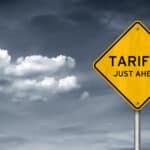For Eons, Global Trade Has Been Crucial for Economic Prosperity
How important are global supply chains? And how dangerous is it to cut off international trade?
Well, historians cite slowing international trade (i.e., killing global supply chains) as one of the many reasons for the decline and eventual fall of the Western Roman Empire in 476 A.D. Lack of trade goods made life more difficult for regular inhabitants of the former Western Roman Empire. Historian Bryan Ward-Perkins notes that third-century Roman peasants would eat off fine pottery made in North Africa. Their descendants in the former Roman Empire would suffer with porous vessels made from badly selected clay.
After centuries of feudal society and little economic growth, areas in Europe started trading internationally again: The Crusades, despite their violence, led to an increase in commerce between the Christian West and the Muslim East; the Hanseatic league controlled trade in the Baltics in the 13th century), the Venetians traded with the Byzantine Empire and the Ottoman Empire in the East.
Trade expanded when Portuguese ships crossed the Horn of Africa, reaching India and the Far East, not to mention Christopher Columbus and Spanish ships “discovering” new worlds that had been there for millennia.
But all this took centuries. And commentators from the media to the investment class are claiming globalization is kaput. But as I argue in my newest book, Insightful Leadership, “specialization, global supply chains and manufacturing operating via economies of scale are the reasons why the Walmarts, Targets, Kohl’s, and Amazons are usually chock full of goods affordable to virtually every family above the U.S. poverty line.”
Reorienting Global Supply Chains for the Modern Era
Unless we want working people to start using fourth-rate goods that third-century Romans would scoff at, supply chain professionals and Insightful Leaders don’t have centuries.
Luckily, as I’ve argued before – and will continue arguing forever – we don’t need centuries. Digital Supply Networks (that’s Chapter 9 of Insightful Leadership) and optionality can reorient global supply chains blocked by trade wars, shooting wars, geopolitical crises, boycotts – whatever the world can throw at us.
From the ASEAN nations to South America to Africa, the world is more than China and Southeast Asia.
Yes, the era of single, lowest-cost sourcing is declining. Multiple sourcing and resiliency are the name of the supply chain game today and tomorrow. But there’s no need for another “Fall of Rome” that will set back civilization for 1,000 years.
Jim Tompkins, Chairman of Tompkins Ventures, is an international authority on designing and implementing end-to-end supply chains. Over five decades, he has designed countless industrial facilities and supply chain solutions, enhancing the growth of numerous companies. He previously built Tompkins International from a backyard startup into an international consulting and implementation firm. Jim earned his B.S., M.S. and Ph.D. in Industrial Engineering from Purdue University.






